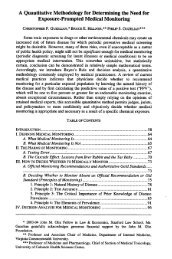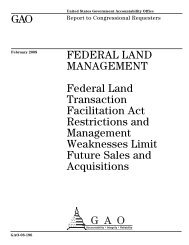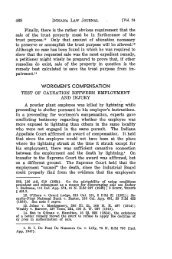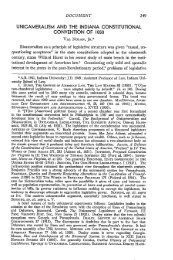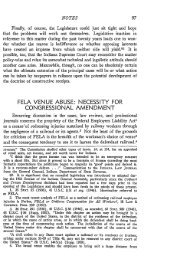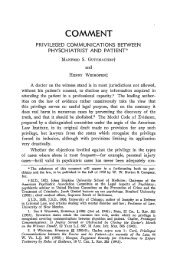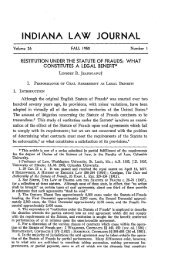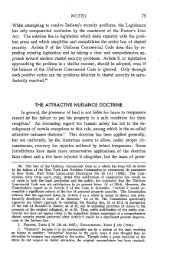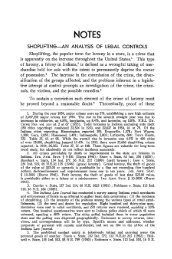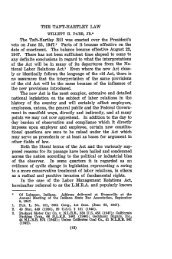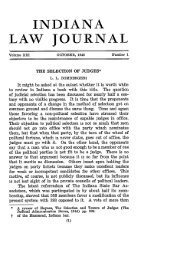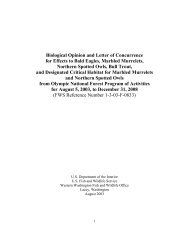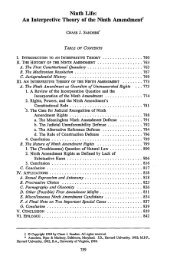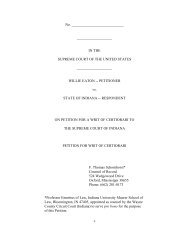constitutional aspects of state extradition legislation - Indiana Law ...
constitutional aspects of state extradition legislation - Indiana Law ...
constitutional aspects of state extradition legislation - Indiana Law ...
You also want an ePaper? Increase the reach of your titles
YUMPU automatically turns print PDFs into web optimized ePapers that Google loves.
NOTES<br />
to solve a somewhat different problem than that dealt with by the Uniform<br />
Extradition Act.' 5 Often parole <strong>of</strong>ficials found it desirable to permit<br />
a parolee to serve the terms <strong>of</strong> his parole in a foreign <strong>state</strong>. Since no<br />
methods were available to supervise the parolee, it was necessary to<br />
utilize <strong>extradition</strong> procedure to achieve return <strong>of</strong> 'a man who had been<br />
only conditionally released from incarceration for the commission <strong>of</strong> a<br />
crime. Following this procedure enabled the parolee to challenge his<br />
return in a habeas corpus action on the technical grounds that, since he<br />
was permitted to leave the demanding <strong>state</strong>, he was not a fugitive from<br />
justice within the meaning <strong>of</strong> the federal statute.: 6 If the <strong>state</strong> relied<br />
upon the Uniform Extradition Act, the parolee based his opposition to<br />
return upon the <strong>constitutional</strong> invalidity <strong>of</strong> that Act. 17 Although these<br />
arguments have been ineffective in <strong>state</strong> courts,' the litigious nature <strong>of</strong><br />
the <strong>extradition</strong> procedure rendered this machinery unwieldly and undesirable.<br />
As a practical matter these defenses may be anticipated by<br />
restricting the parolee to the demanding <strong>state</strong> as a term <strong>of</strong> parole. If a<br />
parolee breaches this term, he then has no standing to question <strong>extradition</strong>.'<br />
9 The undesirability <strong>of</strong> this method <strong>of</strong> return is evident, however,<br />
upon even a slight consideration <strong>of</strong> the influences which make out-<strong>of</strong><strong>state</strong><br />
parole desirable for society.<br />
To alleviate this situation, the Parolee Compact provides for supervision<br />
<strong>of</strong> an out-<strong>of</strong>-<strong>state</strong> parolee by <strong>of</strong>ficials <strong>of</strong> the foreign <strong>state</strong> and also<br />
stipulates that upon breach <strong>of</strong> parole the <strong>of</strong>ficers <strong>of</strong> the paroling <strong>state</strong><br />
may return the violator without resort to <strong>extradition</strong> proceedings. 20<br />
Thus, the Extradition Act, Section 6, permits rendition in circumstances<br />
not sufficient to invoke <strong>extradition</strong> under the federal enactment, while<br />
the Parolee Compact avoids its restrictive provisions by the simple<br />
expedient <strong>of</strong> ignoring established <strong>extradition</strong> procedures. Nevertheless,<br />
similar influential policy considerations support an interpretation <strong>of</strong> the<br />
the governors <strong>of</strong> the <strong>state</strong>s to compact with all the United States on the terms set<br />
down in the enactment. See the discussion by THE COUNCIL OF STATE GOVERNMENTS,<br />
op. cit. supra note 7, at 46-84.<br />
15. E.g., COLO. STAT. ANN. c. 153, §§44(7)-44(25) (1935); IND. ANN. STAT.<br />
§ 9-3001 (Burns Supp. 1951); MICH. Comp. LAws § 7801. et seq (1948); MINN. STAT.<br />
§ 637.16 (1947). For an up-to-date list <strong>of</strong> <strong>state</strong>s which have adopted this compact, see<br />
THE COUNCIL OF STATE GOVERNMENTS, op. cit. supra note 12, at 23.<br />
16. Ex parte Kabrich, 343 Mo. 196, 120 S.W2d 42 (1942).<br />
17. Culbertson v. Sweeney, 70 Ohio App. 334, 44 N.E.2d 807 (1942).<br />
18. In Ex parte Garvey, 133 Tex. Cr. 500, 112 S.W.2d 747 (1938), the court held<br />
that an out-<strong>of</strong>-<strong>state</strong> parolee was subject to <strong>extradition</strong> as a fugitive from justice.<br />
19. Reed v. Colpoys, 69 App. D.C. 163, 99 F.2d 396 (D.C. Cir. 1938); Ross v.<br />
Becher, 382 IIl. 404, 47 N.E.2d 475 (1943) ; Ex parte Summers, 40 Wash. 2d 419, 243 P.2d<br />
494 (1953).<br />
20. UNIFORM PAROLEE COMPACT, IND. ANN. STAT. § 9-3001 (Burns Supp. 1951).




